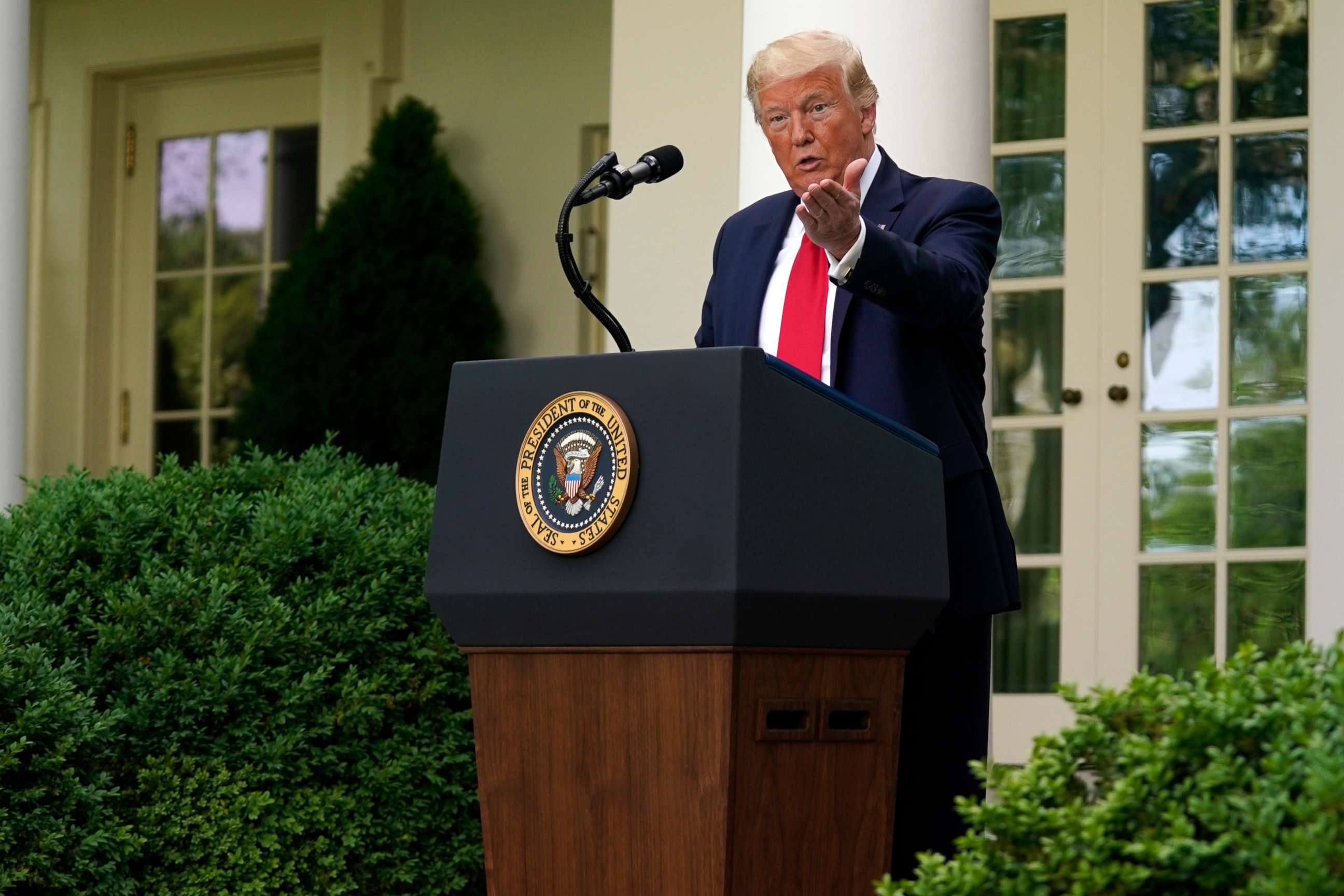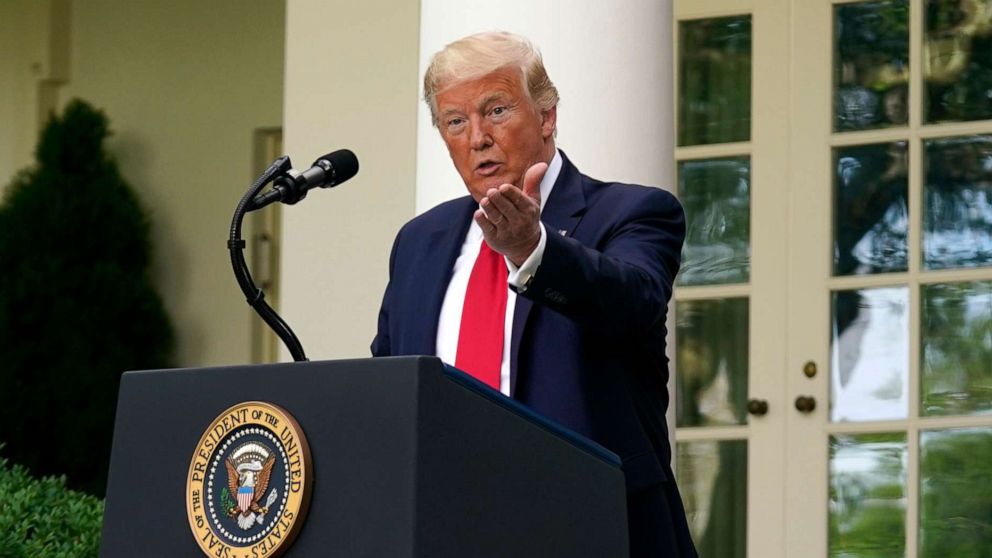Despite widower’s plea, Trump doubles down on murder conspiracy theory targeting cable news host
President Donald Trump ignored the pleas of a widower on Tuesday and reiterated his support for a baseless murder conspiracy theory involving the man's wife that the president has used in recent weeks to smear a cable news host.
Trump said in the Rose Garden that he'd read a letter Timothy Klausutis sent to Twitter asking for the social media company to delete the president's tweets about an unfounded conspiracy that MSNBC "Morning Joe" co-host Joe Scarborough had murdered his wife, Lori Klausutis, in 2001 while she was an intern in his congressional office. Klausutis argued that the tweets violated the company's terms of service. Police ruled no foul play.
Klausutis wrote that the "barrage of falsehoods, half-truths, innuendo and conspiracy theories" around his wife's death, which the president had now helped spread, have made it hard for him to "move forward" with his life.
In response, the president dismissed Klausutis' concerns, "I'm sure ultimately they want to get to the bottom of it."
Trump then doubled down on the conspiracy and said he thought the situation was "very suspicious" and hoped "somebody gets to the bottom of it" despite there being no evidence of foul play.
In the letter sent last week and first reported by the New York Times, Klausutis told Twitter CEO Jack Dorsey that "conspiracy theorists, including most recently the President of the United States, continue to spread their bile and misinformation on your platform disparaging the memory of my wife and our marriage."
"My request is simple: Please delete these tweets," he wrote.
Twitter said in a statement to ABC News that it would not be removing the tweets or adding any labels "at this time" but apologized for the pain the statements had caused.
"We are deeply sorry about the pain these statements, and the attention they are drawing, are causing the family," Twitter spokesman, Nick Pacilio said. "We've been working to expand existing product features and policies so we can more effectively address things like this going forward, and we hope to have those changes in place shortly."

Twitter did add a fact check later on Tuesday to tweets by the president that pushed unsubstantiated claims about mail-in ballots. A Twitter spokesperson told ABC News it had no plans "at this time" to apply the same notice to Trump's tweets pushing the debunked conspiracy theory surrounding Lori Klausutis' death.
In response to Twitter adding a fact check to the president's tweets, Trump campaign deputy press secretary Ken Farnaso said, "Silicon Valley, partners with Fake News CNN, in their continued all-out assault on Trump."
Earlier at Tuesday's White House press briefing, when asked by ABC News' Chief White House Correspondent Jonathan Karl why the president has continued to make the unfounded allegations, White House press secretary Kayleigh McEnany did not answer directly.
"Why is the president making these unfounded allegations?" Karl asked. "The family is pleading with the president to please stop unfounded conspiracy theories. Why is he doing this?"
McEnany pointed the president's tweet earlier on Tuesday, where he claimed the conspiracy wasn't "an original Trump thought."
"Does that justify the president spreading a false conspiracy theory that suggests that he's responsible for murder?" Karl responded.
"It's Joe Scarborough that has to answer these questions," McEnany said.
For months Trump has railed against Scarborough on Twitter, a one-time friend turned harsh cable news critic of the president. But recently, as the "Morning Joe" host and former Florida congressman, has ratcheted up attacks on the president's response to the coronavirus pandemic, Trump has responded by drumming up the dark, debunked conspiracy theory around the 2001 death of an intern in the former Florida congressman's office.
The president has repeatedly pushed the conspiracy -- dating as far back as 2017 -- using his popular Twitter and Facebook accounts.
When the president ramped up attacks on the MSNBC host earlier this month, Scarborough responded on his show blasting Trump: "You, once again, drag a family through this and make them relive it again," he said. "As if losing a loved one the first time isn't enough ... But this weekend, my God, you were supposed to have a working weekend. You got it wrong again."
Co-host Mika Brzezinski, who's also married to Scarborough, said on Twitter that the president reiterating the conspiracy during Tuesday's event in the Rose Garden was "beyond depressing" and "so cruel and full of hate."
"I'm asking you to intervene in this instance because the president of the United States has taken something that does not belong to him -- the memory of my dead wife -- and perverted it for perceived political gain," Klausutis wrote in the letter to Twitter. "An ordinary user like me would be banished from the platform for such a tweet, but I am only asking that these tweets be removed," he claimed, pointing to Twitter's community rules and terms of service.
While Twitter has polices that say users "may not engage in the targeted harassment of someone," Twitter said the president's tweets did not violate the company's terms of service.
And beyond the impact Trump's tweets continuously push the conspiracy theory has had on Klausutis' family, experts fear the possibility that it could lead a supporter to act out believing Scarborough has gotten away with murder.
"He's encouraging his followers to believe in those theories too. And that could even cause some of them to act on those theories," Joseph Uscinski, a political science professor at the University of Miami whose research focuses on fringe beliefs, told ABC News. "If you have an authority figure like the president saying, 'Hey, this guy on TV is a murderer who got away with it,' some people are going to believe that and it only takes one kook to act on it."
"We wouldn't tolerate, normally, people running around just accusing each other of murder without evidence because that's bad. It's even worse when that person has a megaphone that can reach everybody," he said.
Uscinski added that pushing conspiracy theories, like the president did with the birther movement that falsely claimed President Barack Obama wasn't born in the United States, was an important aspect to Trump's rise to power.
"Trump's messaging, which include conspiracy theories quite prominently, are designed to chase after people who are uneasy with the political establishment," Uscinski said. "He won with that and now he has to dance with the one who brought him to the prom."




